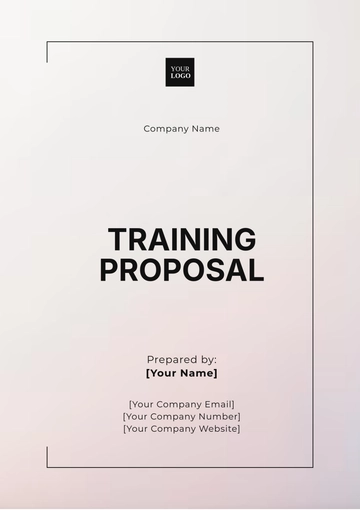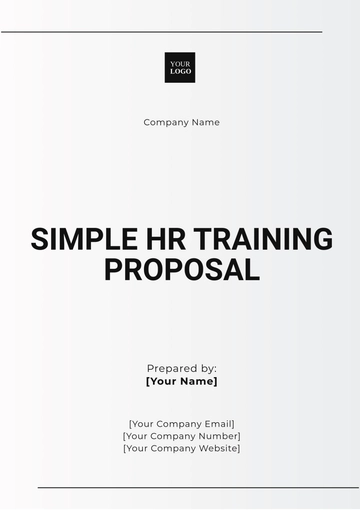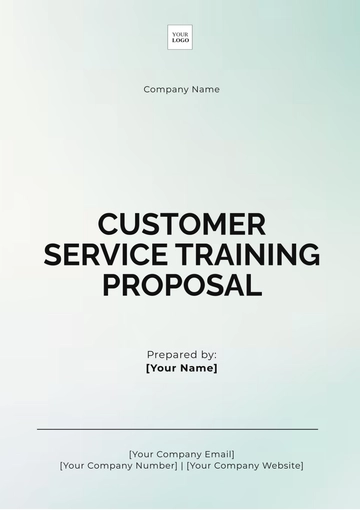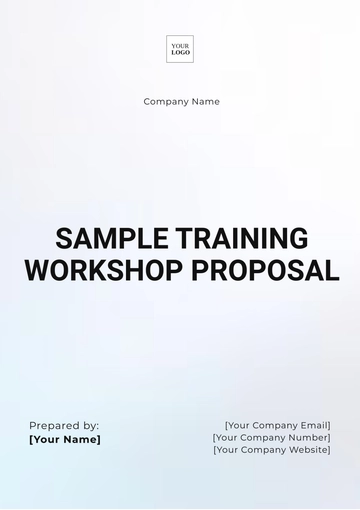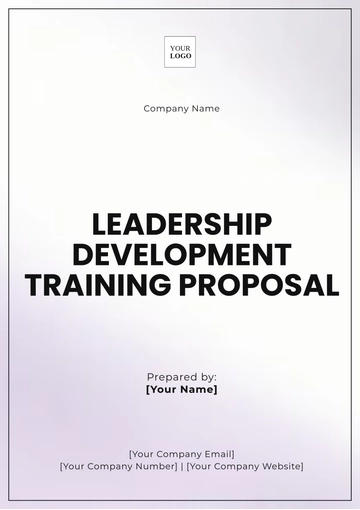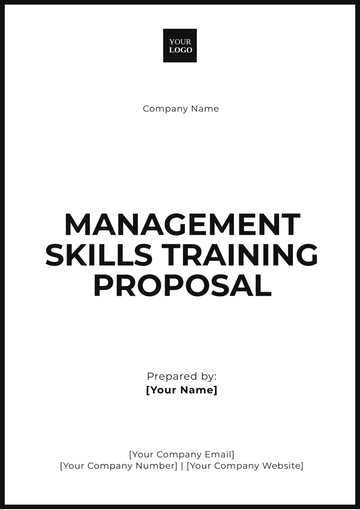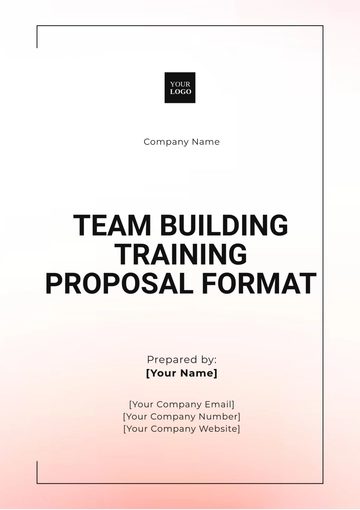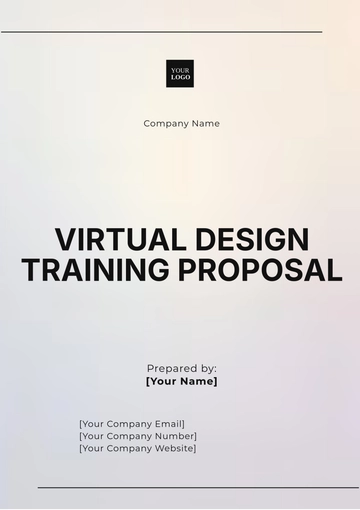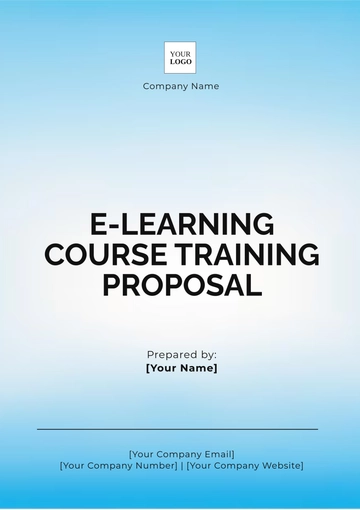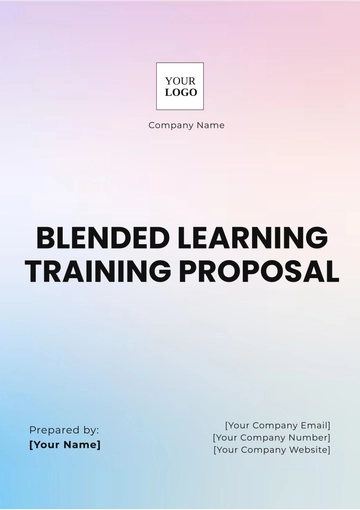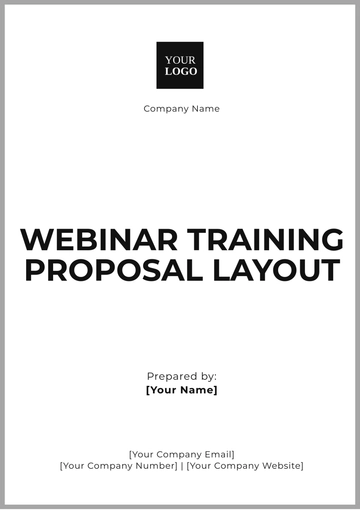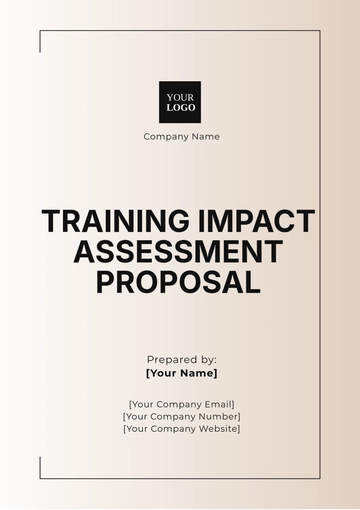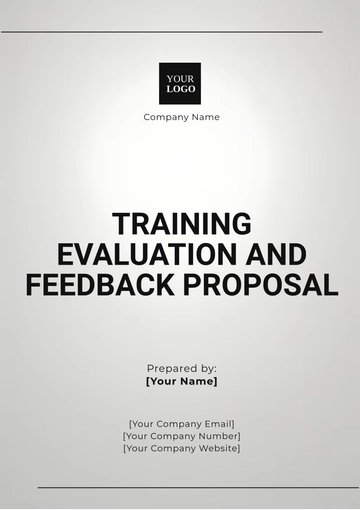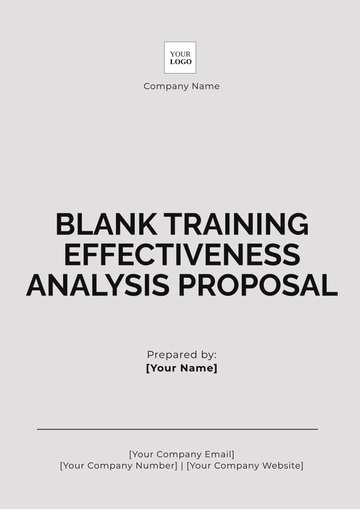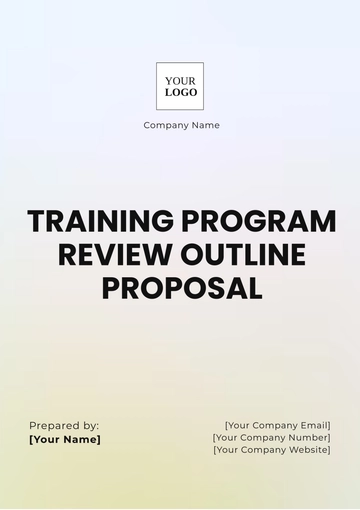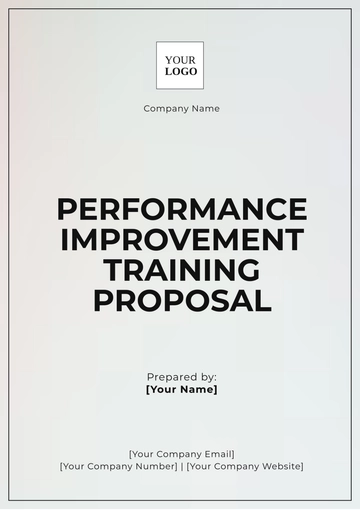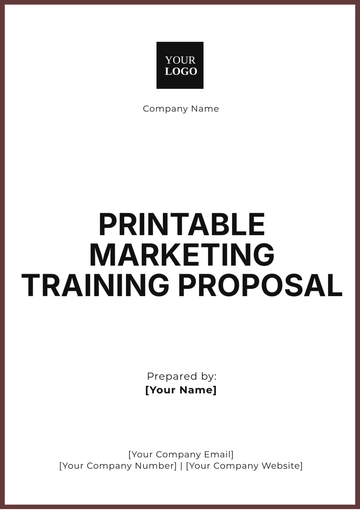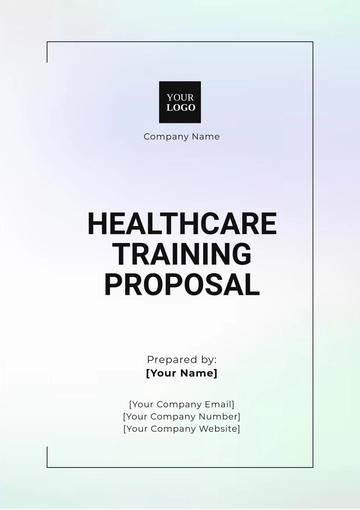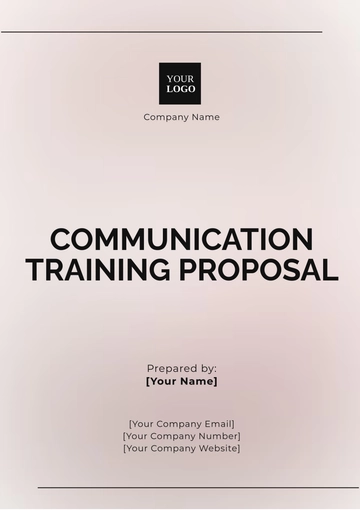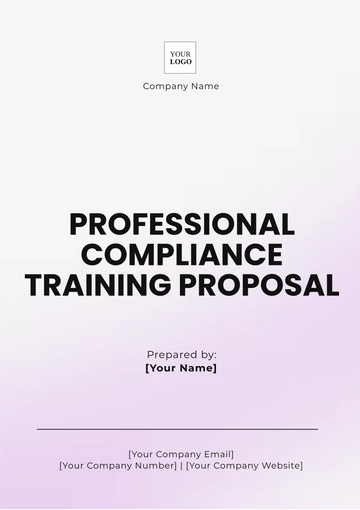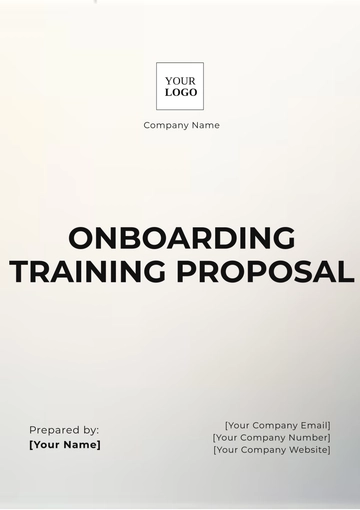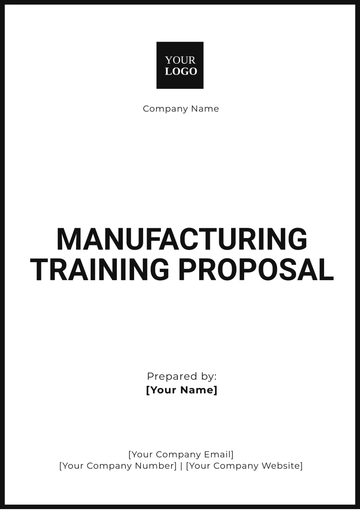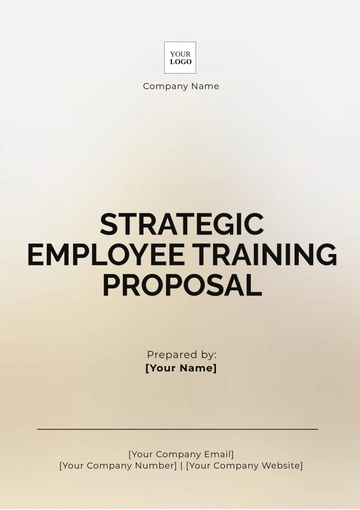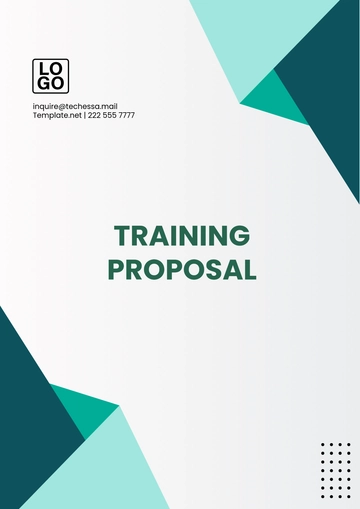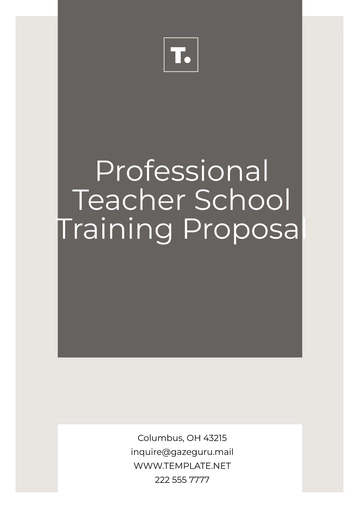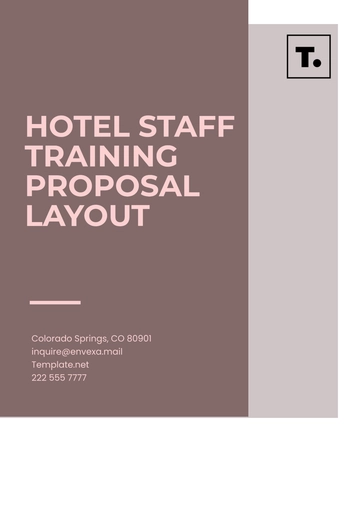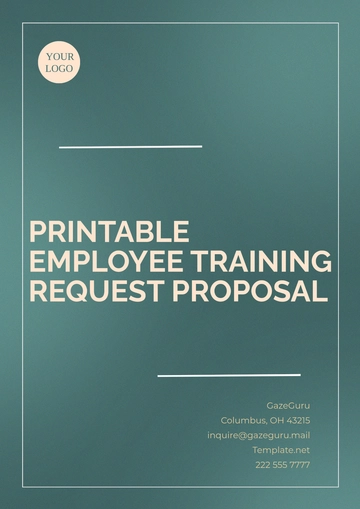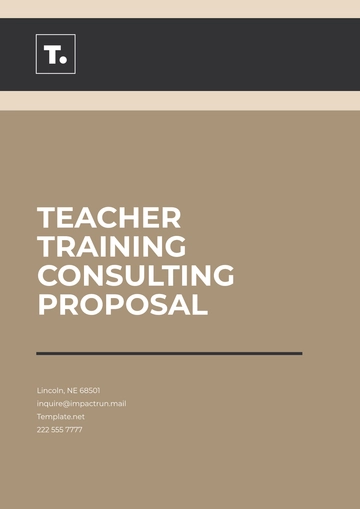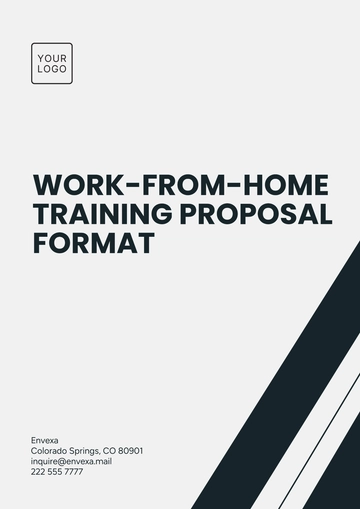Free Communication Training Proposal
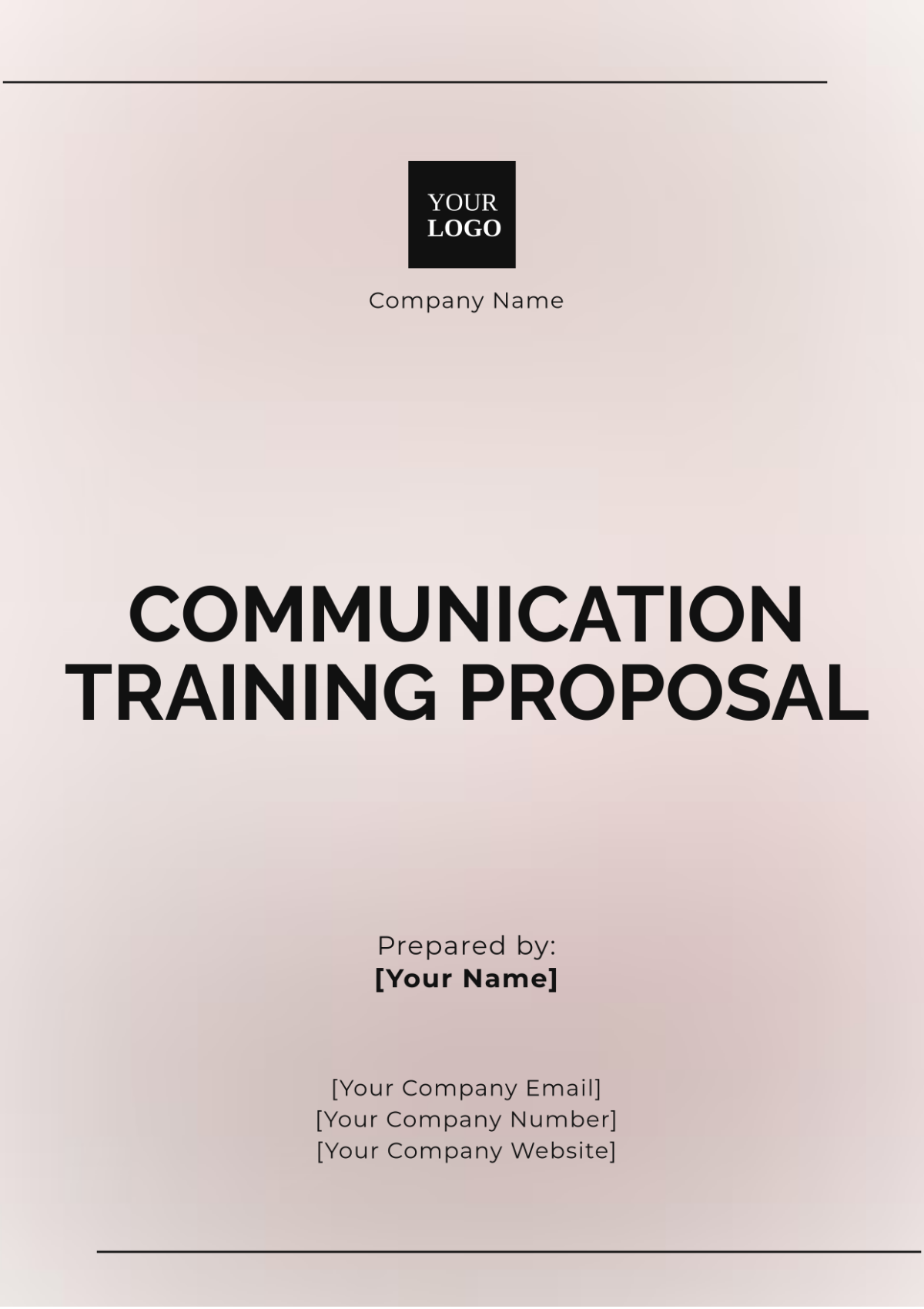
Prepared by: [Your Name]
Company: [Your Company Name]
Date: [Date]
I. Introduction
This Communication Training Proposal is designed to offer structured and adaptable sessions for enhancing communication skills within [Your Company Name]. In today’s dynamic workplace, effective communication is essential for fostering collaboration, improving customer relations, and ensuring organizational success. This proposal outlines a comprehensive strategy aimed at equipping your team with critical communication skills that will deliver measurable productivity improvements, reduce misunderstandings, and promote a positive work culture.
By the end of this training, employees will have developed the verbal, non-verbal, listening, and writing skills necessary to communicate confidently and professionally in any situation.
II. Objectives
A. Enhance Verbal Communication Skills
The goal is to develop clarity, precision, and confidence in verbal communication, empowering employees to express their thoughts more effectively. This will reduce misunderstandings and enhance collaboration across teams.
B. Improve Non-Verbal Communication Understanding
To increase employees' awareness and interpretation of body language, facial expressions, and other non-verbal cues, fostering more efficient interpersonal dynamics. This is essential for managers, customer-facing roles, and team leaders who rely on both verbal and non-verbal communication to lead effectively.
C. Strengthen Active Listening Abilities
To cultivate the ability to genuinely hear and understand others. Employees will learn to listen attentively, which will result in deeper engagement and more thoughtful, informed responses during conversations.
D. Develop Written Communication Proficiency
This objective is focused on enhancing grammar, composition, and overall style in written communications. By improving the clarity and professionalism of all written exchanges—whether emails, reports, or memos—employees will ensure better understanding and avoid confusion.
III. Training Content
A. Module 1: Foundations of Communication
This module introduces the core principles of effective communication by covering the following topics:
Understanding the Communication Process: Explores how information is transmitted and received.
Key Elements of Effective Communication: Focuses on the sender, receiver, message, and feedback.
Common Barriers to Communication: Identifies barriers such as cultural differences, emotional interferences, and technological issues, along with strategies for overcoming them.
B. Module 2: Verbal Communication Techniques
This module is designed to improve spoken communication and includes:
Clarity and Precision in Speech: Emphasizes the importance of clear language and avoiding jargon.
Tone and Articulation: Teaches how to modulate tone to suit the audience and context.
Building Confidence in Speaking: Helps participants overcome anxiety and project confidence in their verbal interactions.
C. Module 3: Non-Verbal Communication Skills
Understanding non-verbal cues is a crucial aspect of communication. This module covers:
Body Language Interpretation: Teaches employees how to read body language to gauge emotions and reactions.
Using Non-Verbal Signals Effectively: Demonstrates how to use gestures, eye contact, and facial expressions to reinforce messages and build rapport.
D. Module 4: Active Listening Strategies
Active listening is a skill that involves fully concentrating on the speaker. This module covers:
Techniques for Engaged Listening: Teaches participants to focus attentively and avoid distractions.
Reflection and Paraphrasing: Demonstrates how to reflect and paraphrase to ensure mutual understanding and prevent miscommunication.
E. Module 5: Advanced Written Communication
This module sharpens participants' ability to craft professional, clear, and effective written communications:
Professional Email Etiquette: Covers writing concise, polite, and professional emails.
Constructing Clear and Compelling Messages: Teaches participants how to structure their writing to improve readability and impact.
IV. Methodology
The training will be delivered using a blended approach to ensure comprehensive learning and engagement. The methodology includes:
Lectures: Brief lectures to introduce and explain core concepts.
Interactive Workshops: Group activities where participants will apply the communication techniques they have learned.
Role-Playing Exercises: Scenarios in which participants practice verbal and non-verbal communication skills in real-life situations.
Group Discussions: Facilitated discussions to share experiences, reflect on learning, and deepen understanding.
This multi-faceted approach ensures participants gain both theoretical knowledge and practical, hands-on experience.
V. Timeline
Week | Activities |
|---|---|
Week 1 | Introduction and Module 1: Foundations of Communication |
Week 2 | Module 2: Verbal Communication Techniques and Practice Sessions |
Week 3 | Module 3: Non-Verbal Communication Skills and Role-Playing Exercises |
Week 4 | Module 4: Active Listening Strategies and Interactive Workshops |
Week 5 | Module 5: Advanced Written Communication and Final Assessment |
Each week will feature a mix of learning activities, ensuring participants can practice new skills and receive feedback from the trainer and their peers.
VI. Budget
Item | Cost |
|---|---|
Training Materials | $500 |
Trainer Fees | $2,000 |
Venue Rental | $1,000 |
Miscellaneous Expenses | $300 |
Total Estimated Cost | $3,800 |
The budget includes all necessary materials, trainer compensation, and venue costs. Miscellaneous expenses account for any additional unforeseen costs.
VII. Trainer Credentials
Our lead trainer, [Your Name], brings over 15 years of experience in corporate training, with expertise in communication development and organizational behavior. [Your Name] holds a Master’s degree in Communication Studies from Stanford University and has been an adjunct professor at Harvard University, where she specializes in teaching effective communication techniques. With a proven track record of delivering impactful communication training, [Your Name] is well-equipped to lead your team toward better communication outcomes.
VIII. Evaluation
Upon completion of the training, participants will be asked to complete feedback forms to assess their satisfaction with the training and their perceived improvement in communication skills. We will also conduct practical assessments during the sessions to measure skill acquisition in areas such as verbal communication, active listening, and non-verbal communication. Follow-up evaluations, including post-training surveys, will be administered after three months to determine long-term impact and areas that may require further development.
This evaluation process ensures that the training achieves its intended outcomes and provides clear data to assess its effectiveness.
- 100% Customizable, free editor
- Access 1 Million+ Templates, photo’s & graphics
- Download or share as a template
- Click and replace photos, graphics, text, backgrounds
- Resize, crop, AI write & more
- Access advanced editor
Enhance communication skills with the Communication Training Proposal Template from Template.net. This editable and customizable template helps you create detailed proposals for communication workshops or training sessions. Ideal for improving team interaction and public speaking skills, it allows you to outline your training objectives and strategies. Easily personalize it with the editable in our AI Editor Tool to meet your specific training needs.
You may also like
- Business Proposal
- Research Proposal
- Proposal Request
- Project Proposal
- Grant Proposal
- Photography Proposal
- Job Proposal
- Budget Proposal
- Marketing Proposal
- Branding Proposal
- Advertising Proposal
- Sales Proposal
- Startup Proposal
- Event Proposal
- Creative Proposal
- Restaurant Proposal
- Blank Proposal
- One Page Proposal
- Proposal Report
- IT Proposal
- Non Profit Proposal
- Training Proposal
- Construction Proposal
- School Proposal
- Cleaning Proposal
- Contract Proposal
- HR Proposal
- Travel Agency Proposal
- Small Business Proposal
- Investment Proposal
- Bid Proposal
- Retail Business Proposal
- Sponsorship Proposal
- Academic Proposal
- Partnership Proposal
- Work Proposal
- Agency Proposal
- University Proposal
- Accounting Proposal
- Real Estate Proposal
- Hotel Proposal
- Product Proposal
- Advertising Agency Proposal
- Development Proposal
- Loan Proposal
- Website Proposal
- Nursing Home Proposal
- Financial Proposal
- Salon Proposal
- Freelancer Proposal
- Funding Proposal
- Work from Home Proposal
- Company Proposal
- Consulting Proposal
- Educational Proposal
- Construction Bid Proposal
- Interior Design Proposal
- New Product Proposal
- Sports Proposal
- Corporate Proposal
- Food Proposal
- Property Proposal
- Maintenance Proposal
- Purchase Proposal
- Rental Proposal
- Recruitment Proposal
- Social Media Proposal
- Travel Proposal
- Trip Proposal
- Software Proposal
- Conference Proposal
- Graphic Design Proposal
- Law Firm Proposal
- Medical Proposal
- Music Proposal
- Pricing Proposal
- SEO Proposal
- Strategy Proposal
- Technical Proposal
- Coaching Proposal
- Ecommerce Proposal
- Fundraising Proposal
- Landscaping Proposal
- Charity Proposal
- Contractor Proposal
- Exhibition Proposal
- Art Proposal
- Mobile Proposal
- Equipment Proposal
- Student Proposal
- Engineering Proposal
- Business Proposal
